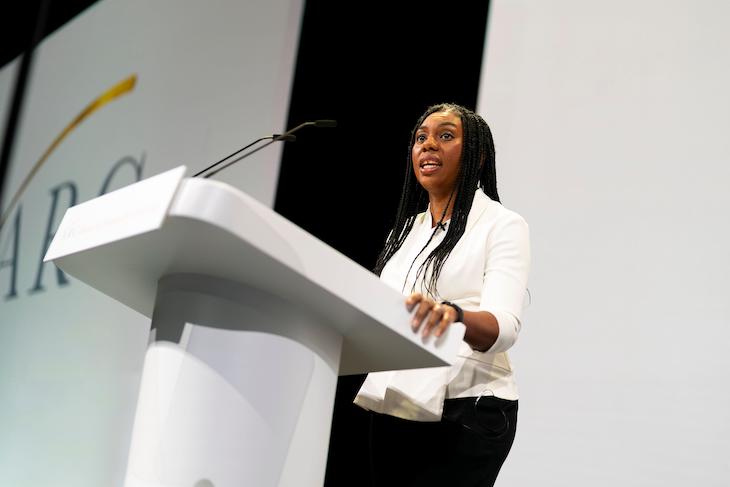Kemi Badenoch made a speech today which mentioned the terms ‘liberal’ or ‘liberalism’ seven times before the word ‘conservative’ got a look in.
The liberalism she was extolling in her address at the ARC conference in London was not of the leftist kind, but the ‘classic liberalism of free markets, free speech, free enterprise, freedom of religion, the presumption of innocence, the rule of law, and equality under it’. And there is not much to cavil over in that little list. Although when one person’s desired ‘freedom of religion’ impinges on other people’s basic freedom of expression then clearly there are priorities to be ranked.
Since the Brexit vote, the rate of inundation has massively increased
But the bigger point, given parlous Tory poll ratings right now, is that this kind of liberalism – classical or ‘Gladstonian’ liberalism – is very far from being a potent, election-winning cocktail. Back when I was reasonably influential in Ukip, I lost count of the number of senior party figures who told me they were ‘classical liberals’ and asked me what I was. ‘I’m someone who wants to get Britain out of the EU,’ was my customary reply.
It wasn’t classical liberalism that achieved that but the innately conservative force of old-fashioned, pro-nation state patriotism. The most dynamic impulse within this was the distaste of working-class people for having their communities inundated without their consent by foreign nationals from different cultures.
Since the Brexit vote, the rate of inundation has massively increased and the ‘otherness’ of the cultures involved has become much more marked: Polish Catholics had far more in common with everyday Brits to start off with than Afghan Muslims do. Consequently, the intensity and range of this culturally and socially conservative objection to the mass immigration of recent years has further increased.
So the logical starting point for a ‘big C’, Conservative party leader setting out her stall would seem to be supporting the ‘small c’ conservatism which values culturally cohesive neighbourhoods, inter-generational kinship ties and a sense of pride in and obligation to the nation.
In her speech, Mrs Badenoch eventually got on to this stuff. ‘Immigration is far too high…Our country is not racist. We don’t need to apologise. We don’t need to pay reparations or give away the Chagos Islands. Free speech matters. Some cultures are better than others,’ she said.
In the middle of that section, she jammed in two other points: that we need ‘smaller government and smarter spending’ and that ‘the world owes no-one a living – millions of people cannot just sit on welfare and expect to be paid to do so’.
In the current circumstances, both social conservatives and classical liberals would subscribe to each of those.
Yet one was left with the impression that, deep down, it is liberalism and not conservatism which is the primary force driving Badenoch’s mission.
It seems increasingly obvious that she is not going to recommend setting aside the European Convention on Human Rights despite it laying at the heart of numerous legal farces and indignities being visited upon the British people.
‘We were members of this convention for half a century without this madness. What’s changed? It’s not the values. It’s the people. They are afraid of creating any kind of conflict, they use the most novel and expansive interpretations of human rights law to avoid it,’ she claimed.
Are the likes of Hugo Norton-Taylor, the upper tier immigration judge who granted a Palestinian family the right to live in the UK after they applied through a scheme originally meant for Ukrainian refugees, really afraid of conflict? Surely believing so underestimates the audacity of their intent.
Badenoch was today speaking to an audience of think-tankers and right-leaning intellectuals and her contribution seemed to land quite well with them. Speaking to – and for – the British people as a whole is her primary task. Right now that mission can be charitably described as a work in progress.








Comments